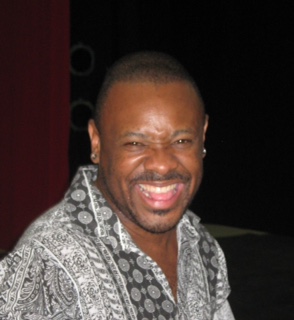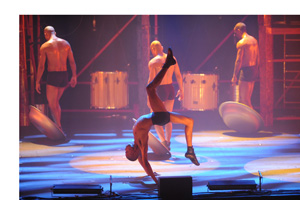 Dancing since the age of 12, Marco Antônio worked as a petrol pump attendant and supermarket employee before going professional. A stint as a lighting technician for a public theatre in Uberlândia resulted in his passion for lighting design. Marco Antônio is a self-made artist who learned his first dance steps in the streets of Brazil as a hip-hop dancer, and is now responsible for Balé de Rua’s choreography, costume and set design.
Dancing since the age of 12, Marco Antônio worked as a petrol pump attendant and supermarket employee before going professional. A stint as a lighting technician for a public theatre in Uberlândia resulted in his passion for lighting design. Marco Antônio is a self-made artist who learned his first dance steps in the streets of Brazil as a hip-hop dancer, and is now responsible for Balé de Rua’s choreography, costume and set design.
When he founded Balé de Rua with Fernando and José Marciel, Marco Antônio was provided with the opportunity to develop his skills as a professional choreographer, without attending formal dance school. The main aim of Balé de Rua was to invent an identity, a dance free from all types of classification. In this sense, the company is still a free space in which he develops his ideas. While Marco Antônio continued to dance in the early stages of Balé de Rua, he has been dedicating more time of late to the creation of lighting, sets and costumes for all the company’s shows. As a multi-talented performing artist, he sees a connection between everything on stage. He already won many prizes in Brazil and abroad presenting his creations in 13 countries all over the world.
 Balé de Rua’s Baila Brazil is playing at the Southbank Centre from 5–15 August as part of the Festival of Love.
Balé de Rua’s Baila Brazil is playing at the Southbank Centre from 5–15 August as part of the Festival of Love.
Have you always wanted to be involved in dance?
I have wanted to be involved in dance since I was a teenager, around 14 years old.
Where did you train and what was it like?
I learned from the streets of Uberlândia, with my friends. After some time I started to see and appreciate other kinds of dance too, like ballet and modern dance. I started researching different types of dance, looking into different techniques to understand it better and to broaden my horizons. Dance came very naturally to me. At first it was a pleasure. Then it became a necessity.
What was a typical day like?
Lots of blood, sweat and tears. Every day was hard work. Stretching. Exercises. Training. Studying. Repeating and repeating. Going further. Pains, and sometimes tears of joy.
What is a typical day like now?
Every day is a challenge. To be touring is amazing but it is also very hard. It demands a lot of work and energy. A dancer must be very strong to face it and sometimes we have to deal with injuries and sickness. It is also difficult to be far away from home and family.
Tell me more about your dance ethos and Balé de Rua.
Our philosophy is simple: respect each other, humility, faith in God and union. The company became a life ideal to us and so the community is more important then the individual. We remember every day to keep the ideal alive: our love for dance. We are like family and we take care of each other.
What is your favourite thing about dance?
The movement. The body in motion. The feelings that come with it. To express ideas and emotions through movements. Dance is ritual, ecstasies and trance. To dance is to be connected with a higher level of existence. It’s to be real.
What or who inspires you most on a daily basis, and in terms of dance too?
The dancers of the company are my biggest inspiration. Everything comes from them, from living together with them, from our talks.
What advice would you offer to an aspiring dance artist?
To believe in their dreams of becoming a dancer. To be dedicated. To go deeper and deeper and to work hard. Nothing comes easy.
What’s next for you after the Southbank Centre?
The ongoing work we do in Uberlândia is very important to the company. Our “New Talents” project is like a dance school where we teach new dancers. We pass on our philosophy and our style of making dance to new generations. We give them dance and respect and they give us back a lot of energy. We would love to build a theatre dedicated entirely to dance. A building that will last forever.
